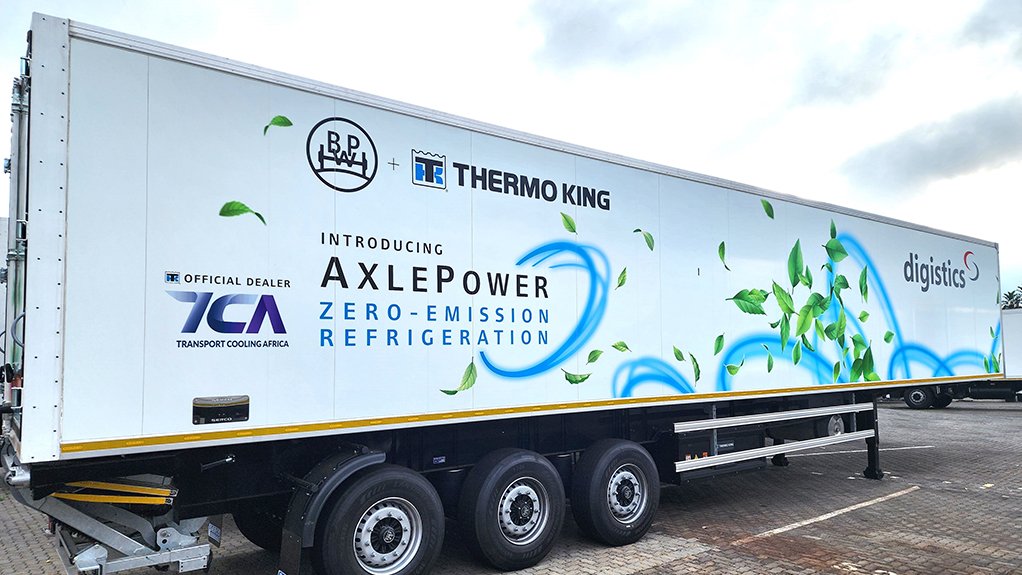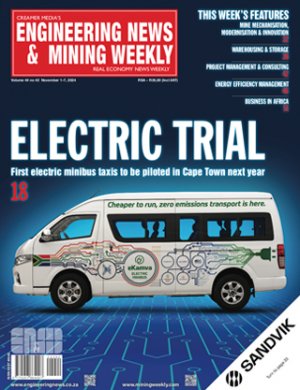Some of the first South African-built refrigerated truck trailers equipped with the AxlePower System, an electric axle-driven system for powering cooling units, have been delivered by insulated and dry freight truck body and trailer building company Serco.
The technology powers a refrigeration unit by harnessing the energy recovered by the trailer’s axle during routine operation.
“The system has been available in Europe for some years but has gained popularity as the technology has been refined. The incorporation of this technology showcases Serco’s innovation abilities and our commitment to helping transporters reduce their running costs and CO2 emissions,” says Serco CEO Clinton Holcroft.
Between November last year and June, Serco delivered six refrigerated, electric axle-driven trailers to two leading transporters which will use the trailers for local and long-distance deliveries across the country.
This brings the total number of refrigerated trailers supplied by Serco with the AxlePower System to seven, with the first trailer delivered by the company in November last year. There are 11 additional trailers currently on order and more are in the pipeline, states Holcroft, emphasising that since fitting the first AxlePower System, the company has received positive feedback, confirming that the electric axle-driven trailer is robust enough and suitable for local road conditions.
“Forecasts from customers indicate that demand will grow as transporters continue to realise the benefits of the system.”
Holcroft explains that the lead time for delivery of Serco’s electric axle-driven trailers is about two to three months from the date of order. The trailer chassis and refrigerated body are locally manufactured by Serco at its trailer manufacturing plant in Durban, KwaZulu-Natal, while the battery, inverter and components for the electric axle system are imported.
“Being a new system, we needed to work closely with the axle and fridge suppliers to ensure that the chassis can accommodate the additional weight of the battery energy storage system. We also needed to design the chassis in such a way as to ensure maximum ground clearance to provide added protection from impact while on the road.
“The imported components for the axle-driven system are built under stringent quality control procedures and comply with European standards. The system, which is fitted to the trailer, is also tested and signed off by technicians before being handed over to the client,” says Holcroft.
The running gear – the main wearing part on the trailer – is serviced as usual by transporters or through Serco after sales repair centres located in Gauteng, the Western Cape, EThekwini and Gqeberha. However, technicians require additional training to service and repair the special components comprising the AxlePower System, which Holcroft says is relatively low maintenance.
Greener Transport
Developed and tested in Europe over a period of more than ten years, the AxlePower System is aligned with growing demand from transporters for solutions that reduce their carbon footprint.
Using free and sustainable power, the technology enables zero trailer carbon emissions and is expected to save 27 t of CO2/y per trailer compared with a traditional diesel-powered trailer refrigeration system.
“The smart energy generating system comprises specially adapted disc braked axles, with battery packs for energy storage. The kinetic energy is converted into electricity through the axle system, thereby powering the refrigeration unit without the need for diesel.
“Diesel is a large component of a transporter’s operating cost. Therefore, progressive transporters are looking to adopt new technology to reduce their running costs by decreasing the amount of diesel used by their fleet. Diesel is also a high-risk item for theft. Limiting theft can reduce shrinkage, which is a hidden cost when using diesel,” elaborates Holcroft.
Payback on investment is achieved after six to seven years through the diesel saving enabled by the AxlePower System, depending on mileage, with the lifespan of a trailer normally being ten or more years.
EMAIL THIS ARTICLE SAVE THIS ARTICLE ARTICLE ENQUIRY
To subscribe email subscriptions@creamermedia.co.za or click here
To advertise email advertising@creamermedia.co.za or click here













